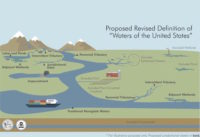California Scales Back Multi-Billion Dollar Water Tunnel Proposal

California's revised WaterFix Plan.
Graphic courtesy of the California Department of Water Resources
Facing a funding shortage and continued environmental opposition, the state of California announced it will build one, rather than two, tunnels in a staged approach to its multi-billion WaterFix plan to funnel water from the Sacramento River to southern California.
The change was not a complete surprise. Requests for qualifications for engineering services, that went out Dec. 7 and are due March 2, asked respondents to address how their submittals would be impacted if there were such a staged implementation.
The announcement, made Feb. 7, calls for a single 40-ft wide gravity-fed tunnel to deliver up to 6,000 cfs from two intakes on the Sacramento River through a 35-mile tunnel under the Sacramento-San Joaquin River Delta to farmers in the south, and cities, including Los Angeles. The cost for the single tunnel project would be about $11 billion.
The two-tunnel proposal, which the state says could still be built if funding becomes available, calls for three intakes on the river to move 9,000 cfs, at a cost of $16.3 billion. But that plan has been in question since last year, when the Westlands Water District voted not to join with the other dozen water agencies who have signed onto the project.
In the Feb. 7 announcement, the state Department of Water Resources says water agencies are expected to finalize agreements to finance the project this spring. It says it will issue a draft supplemental Environmental Impact Report in June addressing the environmental impacts of building one, rather than two, tunnels, but that “preliminary modeling indicates that there are no new water quality or aquatic issues related to staging the implementation.”
Water Resources director Karla Nemeth said the project could break ground by the end of the year. Representatives from CH2M, TetraTech and MWD were among the 45 firms that attended a pre-submittal conference for the RFQ in December.
Restore the Delta, an environmental group opposed to the project, says that the project still doesn’t have enough money to move forward, and that moving through the revised environmental impact studies is “unconscionable.”



